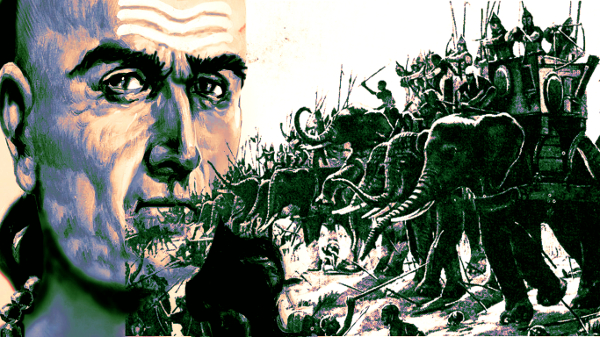Chanakya believes that foreign policy is of utmost important for the stability of a state. The states cannot remain in isolation with the policies of others. The actions taken by each state has a direct of indirect impact on the other states and their relations with each other.
The fundamental truth guiding, the foreign policy of a state should be the welfare (Yogakshema) of the state. Welfare of the state is welfare of the people of the state for a sustainable positive growth. Today, the welfare can be stated as the means to achieve self-esteem for a state, the social-political-economic strength, the economic and social well-being of the citizens of the state. The means to achieve a balanced and effective foreign policy is defined by Chanakya as the concept of “Mandala” i.e Circle of States.
The Mandala concept is one in which there are circles of friends and foes with the central point being the Principle King and his State.
This is a well thought out strategy to consolidate power for the Kingdom who employs this concept.
Mandala in Sanskrit means ‘Circle’. The concept is also known as ‘RAJAMANDALA’ meaning, ‘CIRCLE OF KINGS’.
The concept stems from the basic fact that “Your neighbor is your natural enemy and the neighbor’s neighbor is your friend”. Kautilya fine-tuned this theory for foreign relations and diplomacy.
This concept embraces twelve kingdoms in the near border of the principle Kingdom , where Chanakya considers these bordering kingdoms as neighbors as well as enemies, the states which are the enemies’ neighbors are his enemies’ friends and the next circle of states are his friends.
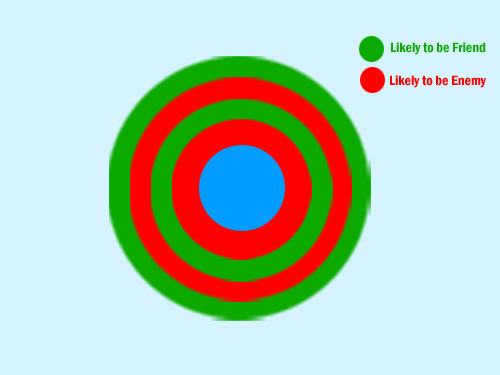
Kautilya proposes that the nations which are his neighbors and are also neighbors of his enemies are neutral and should always be treated with respect. He believes that this circle is dynamic in nature and the King should work towards expanding his central position and employ means to reduce the power of the other kings in his vicinity.
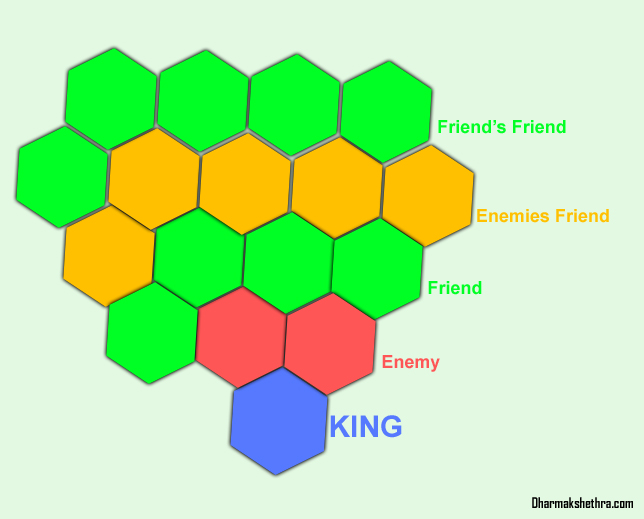
He also proposes to build alliances with states which are two degrees away from the center to create a balance of power.
The Mandala concept is of multi-polar nature. Today our world, is trying to be multi-polar economically and militarily. Unfortunately, we see a Uni-polar world at the military front but economically otherwise. Kautilya, saw the middle power as an important step in creating a balance in the world order.
Kautilya says that “War is an outcome of a power struggle and state sovereignty”
Diplomacy is a ephemeral phenomenon and is a set of tools to attain means to avoid confrontation, which at one point becomes inevitable. Chanakya’s theory of foreign policy however, doesn’t advocate unnecessary war. Given the option, he prefers peace on war. The principles of his foreign policy are hybrid in nature and is equally applicable for non-strategic , semi strategic, economic, sociopolitical relations among nations.
Classification of Foreign Rulers
Mandala theory is based classification of FOREIGN RULERS under 4 distinct categories.

Ari – Enemies
Kautilya concludes that the king and his immediate neighbors are the Natural Enemies.
Any king who attempts to cause trouble to the principle kingdom without reasonable cause is an “Artificial Enemy” of that principle Kingdom.
Mitra- Friends
The best kind of friend in the concept of Mandala according to Kautilya, is the one who is consistent in behavior, Noble in approach, Straight Forward in matters and whose friendship is inherited from father or grandfather (Generations).
Any other King whose friendship is courted for the sake of protection of life and property is an Artificial Friend.
Madhyama- Mediators
The King whose kingdom is situated close to that of a king and his wicked enemy ; who is capable of helping both the kings or of resisting either of them,is a MEDIATOR according to Kautilya
Udasina -Neutrals
The King whose territory is situated between the territories of two rival kings and who was powerful enough to help or resist either of them or a mediating king was Neutral.
The distinction between Neutral and Mediators are not very clear but logically the king who remained passive in regard to both the parties are Neutral while Madhyama king was the one who exerted his influence to bring reconciliation.
The Classes of Neighboring King
The neighbouring king belong to either of four classes
- Rearward Enemy – Parshnigraha
- Rearward Friend – Akaranda
- Ally of a Rearward Enemy – Parshnigrahasana
- Ally of a Rearward Friend – Akarandasara
Kautilya affirms that a powerful king should always try to make himself center (Nabhi) of the circle (Mandala).
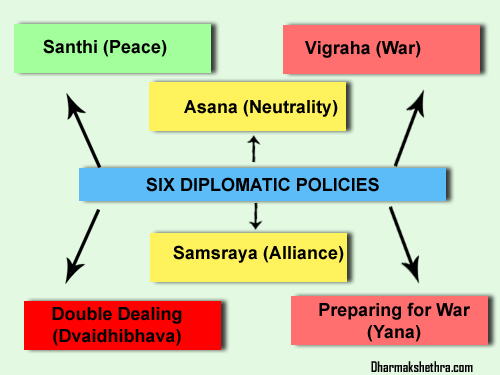
To consolidate the power,the king should best adopt any of the following policies, namely, peace (Sandhi), war(Vigraha), neutrality (Asana), preparedness for war(Yana), alliance(Samsraya) and double dealing (Dvaidhibhava) according to the situation which is presented to the king.
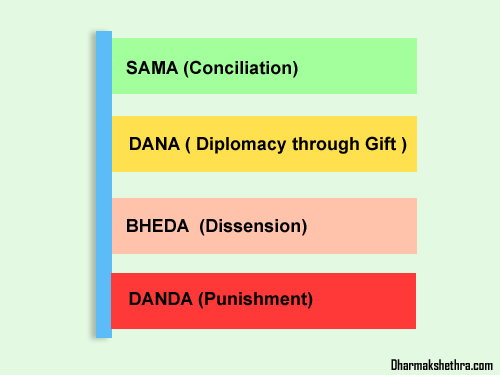
The policies can be implemented through exercising these four methods which are : conciliation (Sama), making of gift (Dana), showing of dissension (Bheda), punishment (Danda).
Author: Sorcerer
Image Courtesy: Pragyata
You may also like
-
India Suspends Tourist Visas Issued to Chinese Nationals: IATA
-
UK PM Boris Johnson Signals Visa Flexibility with India to Win Trade Deal. Key Highlights
-
Thailand Gets India-Made Covid Vaccines Under Quad Initiative
-
Chief of Naval Staff (CNS), Admiral R Hari Kumar Visited Maldives
-
India & Finland Discuss Possible Areas of Co-Operation in Quantum Computing for Virtual Centre of Excellence (CoE)
